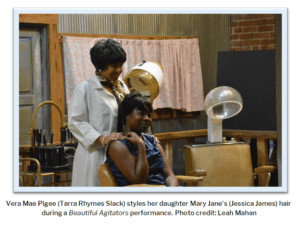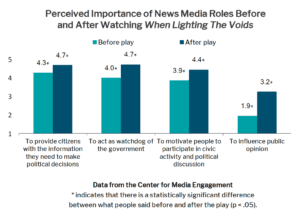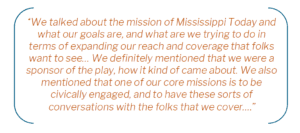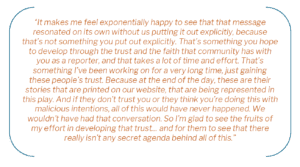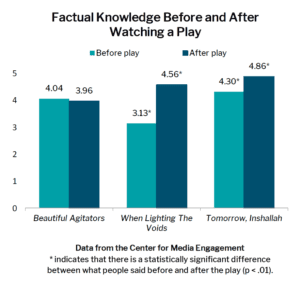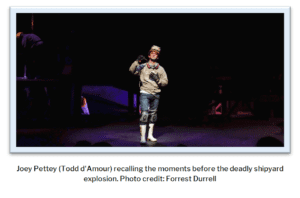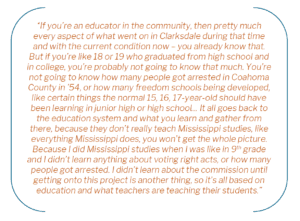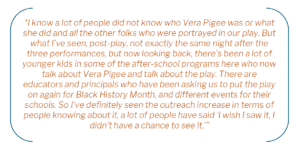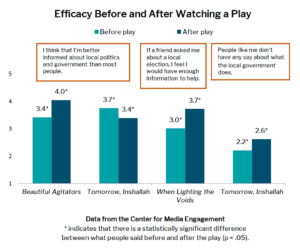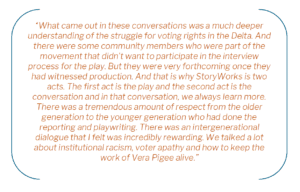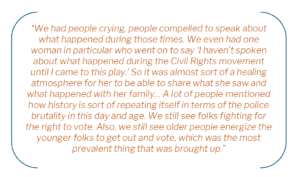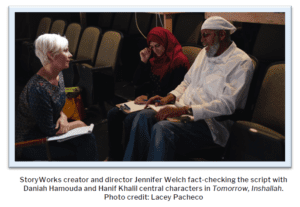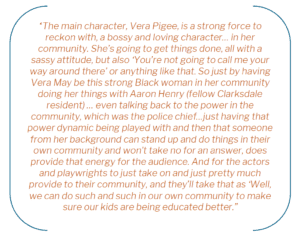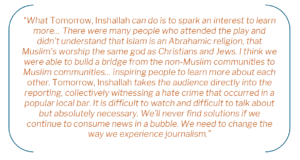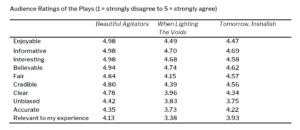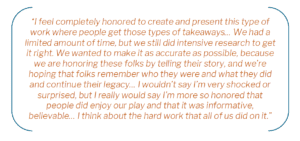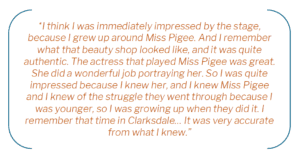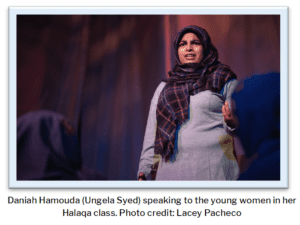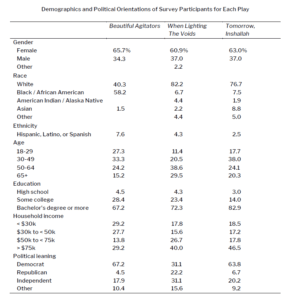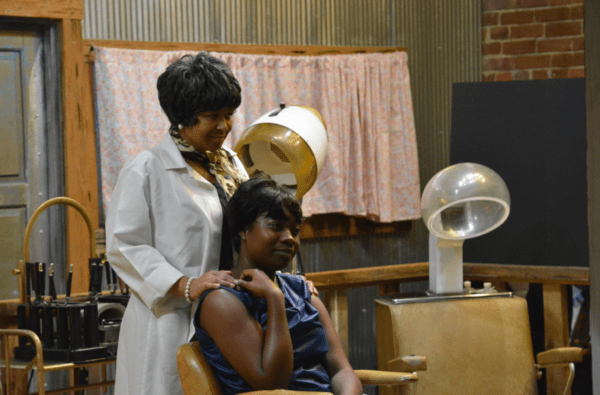
In a new study, the Center for Media Engagement partnered with The Center for Investigative Reporting and StoryWorks to see how theater affects audiences when used as a form of journalism. To achieve this, we analyzed how audiences responded to three plays based on investigative reporting. Although each play influenced audiences differently, we found that they did affect people’s perceptions of the news media, factual knowledge, and intentions to engage civically. The results suggest that news organizations can use journalism-based theater to connect, empower, and inform audience members.
Key Findings
- Journalism-based theater can lead audiences to perceive certain media roles (like acting as a government watchdog) as more important.
- It can help audiences see news organizations more favorably.
- It can increase people’s knowledge and affect their beliefs and intentions.
Implications for Newsrooms
Journalistic storytelling through live theater performances can be both enjoyable and accurate. Although each play affected audiences differently, the performances did affect what people believe. Journalism through theater can help increase people’s knowledge and can contribute to changing people’s perceptions of the media and their intentions to engage civically. Specifically, after watching a play based on journalistic reporting and participating in a conversation about it, some people changed their views about the role of media. For instance, audience members for two of the plays thought that it was more important for the news media to act as a government watchdog or to advocate for social change. The news organizations involved also were rated more favorably by audiences after the performances. Audience members can also gain knowledge and express a greater willingness to engage in activities such as contacting a public official and reading about issues related to the play. Importantly, the plays did not have uniformly positive effects; two plays generated an increase in audience members’ confidence in their ability to engage in the political process and one play reduced this confidence. These findings show that the play’s content matters. Although each play was unique, the results of this study suggest that news organizations can use this form of storytelling to connect, empower, and inform audience members.
The Study
How do you define news? Journalism can take many forms, including news articles, tweets, and, as we examine here, theater. In this report, we raise the curtain on the impact of plays based on investigative reporting. The Center for Media Engagement partnered with The Center for Investigative Reporting (CIR), a nonprofit journalism organization, and StoryWorks, a documentary theater project, to analyze how audiences responded to three journalism-based plays. In addition to surveying 279 people, we interviewed 13 people associated with the plays, including the director of the three shows, playwrights, actors, reporters, and community members, to learn about their experiences and to get their assessments about the impact of the plays.
We found that journalistic storytelling through live theater performances can make a difference. For this study, we examined three plays and found that after the performances, audience members:
- Perceived certain news media roles – e.g., to act as a government watchdog or to advocate for social change – as more important. This happened for two of the three plays.
- Evaluated any partnering news organization – Mississippi Today or HuffPost – more favorably. For one of the plays, audience members were also more likely to know which news organization sponsored the play.
- Were more knowledgeable about an issue or event addressed in the play. This happened for two of the three plays.
- Differed in how confident they felt about their political knowledge and their ability to engage in the political process. For two of the plays, audience members felt more confident after watching. For the third play, audience members felt less confident after watching.
- Were more likely to say they would contact a local public official for one of the three plays.
- Were more likely to say they would read about issues related to the play and attend another play for one of the three plays.
- Rated each of the plays positively. They found them to be highly informative, believable, credible, accurate, fair, interesting, and enjoyable.
These findings suggest that live theater performances based on investigative journalism can help increase people’s knowledge and can contribute to changing their perceptions and intended behaviors. In addition, storytelling that combines journalism and art can be perceived as both accurate and enjoyable.
For this report, we studied three original plays: Beautiful Agitators, When Lighting The Voids, and Tomorrow, Inshallah. The plays were produced by The Center for Investigative Reporting (CIR), a nonpartisan and nonprofit investigative journalism organization based in the San Francisco Bay Area, and StoryWorks, a documentary theater project that was part of CIR and later became an independent entity.
Beautiful Agitators is about the life and legacy of Mississippi civil rights activist Vera Mae Pigee. It explores her efforts to register thousands of African Americans to vote and draws on interviews conducted by four journalists, including one from the digital news site Mississippi Today. The play was written by Jessica James, Nick Houston, Charles Coleman and Aallyah Wright, and was directed by StoryWorks creator Jennifer Welch. It was performed at Crossroads Cultural Center in Clarksdale, Mississippi three times between August 14th and August 16th, 2017.
When Lighting The Voids explores the causes and effects of the fatal explosion at an Escatawpa, Mississippi shipyard in 2009. The play examines shipbuilding, the experiences of people who work in the industry, and its importance to the Gulf Coast culture and economy. It was written by Jon Bernson, directed by Jennifer Welch, and was based on CIR’s reporting from Jennifer Gollan. The play was performed at Center Stage in Biloxi, Mississippi four times between May 24th and May 27th, 2018.
Tomorrow, Inshallah examines what it means to be Muslim in America’s heartland. The play addresses realities of the everyday existence of Muslims, including a fatal shooting that exemplifies the depth of misunderstanding and distrust in society. It was written by Rehana Lew Mirza, directed by Jennifer Welch, and based on reporting of HuffPost journalists Rowaida Abdelaziz and Chris Mathias. The play was performed at The Living Room Theatre in Kansas City, Missouri 12 times between July 20th and August 5th, 2018.
Importantly, this was not just a passive event. Each performance of each of the three plays was followed by a conversation between people involved in the play (including the journalists, director and actors) and the audience.
For each of the three plays, audience members aged 18 or older were invited to participate in a survey before the performance and after they had seen the play and engaged in conversation about it. We randomly asked half of the participants to answer our key measures before the play and background questions after the play, and the other half to answer the key questions after the play and background questions before the play. This allowed us to compare what people thought prior to the play to what they thought after the play.
In total, 279 people completed the surveys: 67 for Beautiful Agitators, 47 for When Lighting The Voids, and 165 for Tomorrow, Inshallah. They answered questions that examined their knowledge about issues or events addressed in the play, confidence in their ability to engage in the political process, and their likelihood of engaging in civic activities. They also answered questions related to news media and evaluated the plays. We then interviewed 13 people related to the plays to better understand the survey results.
People Changed Their Views About the News Media’s Role After Watching the Plays
Survey participants were presented with a list of six “things the news media do, or try to do” and were asked to indicate how important each item was from 1 (not at all important) to 5 (extremely important). The six items were:
- To provide citizens with the information they need to make political decisions,
- To be an absolutely detached observer,
- To act as watchdog of the government,
- To motivate people to participate in civic and political discussion,
- To advocate for social change,
- To influence public opinion.1
For two of the plays, When Lighting The Voids and Tomorrow, Inshallah, participants who answered after watching perceived the news media differently than participants who answered before watching.
Those answering the questions after watching and discussing When Lighting The Voids perceived four roles of the news media as more important than those answering the questions beforehand:
- To provide citizens with the information they need to make political decisions,2
- To act as watchdog of the government,3
- To motivate people to participate in civic and political discussion,4
- To influence public opinion.5
Those answering after watching Tomorrow, Inshallah perceived two roles of the news media as more important than those answering beforehand:
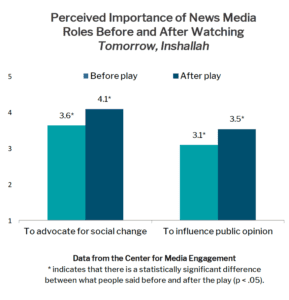 For Beautiful Agitators, there were no statistically significant differences between survey participants answering the questions after the play and those answering beforehand.
For Beautiful Agitators, there were no statistically significant differences between survey participants answering the questions after the play and those answering beforehand.
To understand why participants’ views of the news media changed, we asked those involved in the plays to reflect on the experience. Those involved in When Lighting The Voids speculated that the change is related to the extensive and meticulous investigative reporting on which the play is based. The play was constructed from interviews with Occupational Safety and Health Administration (OSHA) investigators, shipyard workers, lawyers, and family members of people who were injured or killed at a shipyard. A journalist from CIR reported on lax safety at shipyards that thrive on military contracts, and the playwright and director of the play conducted follow-up interviews to bring the story to life on stage.
Playwright Jon Bernson explained: According to Bernson, the investigative reporting and production of the play took about a year. In post-play conversations with the audience, director Jennifer Welch provided a rundown of the creation of the play in the presence of CIR’s editor-in-chief.
According to Bernson, the investigative reporting and production of the play took about a year. In post-play conversations with the audience, director Jennifer Welch provided a rundown of the creation of the play in the presence of CIR’s editor-in-chief.
In addition, Bernson thinks that “the reporting and journalism are more apparent in Voids than in the other plays, not in a better or worse way.” One way the reporting manifests in Voids is through conversations between a therapist and Joey Petty, a shipyard worker who survived an explosion and saw his friends get killed. “I thought the reporting was compelling … so I tried to keep that element within the play,” Bernson explained. “A lot of it resurfaces in Joey Petty’s therapy sessions… They feel like an interview from a journalist at times… I’m just projecting, but I could see how one would watch that play and feel the direct impact from the journalism.
Jennifer Welch, the StoryWorks creator who directed the play, attributed the perceived importance of news media roles to several elements: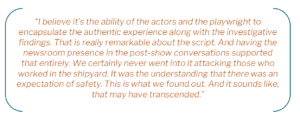
CIR found that major private shipbuilders earned money from federal contracts despite having been cited for serious safety lapses. This finding, which is addressed in the play, may be related to the perceived importance of having the news media act as a government watchdog. Bernson thinks that, while there is nothing wrong with using the word “watchdog,” it is important to bear in mind that “these stories that get turned into plays are not generated from an activist standpoint. They are generated from a journalistic standpoint… The idea is to give people objective awareness of what’s happening – to be fair, and to have verified sources, to arm people with the facts, and not necessarily tell them what to do with those facts.”
Welch provided another insight about the audience perception of news media roles:
 We also asked people involved in Tomorrow, Inshallah what they thought about the survey result that those watching the play were more likely to think it was important for the news media to advocate for social change and to influence public opinion. “Based on the nature of what the play was about and… touching on social issues, I can see why people said that,” actress Ungela Syed told us. “I think that’s great,” said playwright Rehana Mirza. “I think that one of the goals of the project was to bring more awareness and get people to want to take a more active hand in community building.”
We also asked people involved in Tomorrow, Inshallah what they thought about the survey result that those watching the play were more likely to think it was important for the news media to advocate for social change and to influence public opinion. “Based on the nature of what the play was about and… touching on social issues, I can see why people said that,” actress Ungela Syed told us. “I think that’s great,” said playwright Rehana Mirza. “I think that one of the goals of the project was to bring more awareness and get people to want to take a more active hand in community building.”
HuffPost journalist Rowaida Abdelaziz further explained, “I think the thing that we discussed and want to advocate for is to dispel a lot of the myths and the misinformation out there around the Muslim community… I would say we wanted to specifically advocate for that with the play and the reporting around it.” In a similar vein, her HuffPost colleague Chris Mathias said, “We’re pretty clear throughout the play that we believe Islamophobia is a problem and that we believe it is our mission to make social change.”
Audiences Learned About the News Organizations Involved in the Plays
Survey participants were asked not only about the news media in general, but also about the specific news organizations that partnered with CIR in the creation of the plays: Mississippi Today (a relatively new non-profit news organization involved in Beautiful Agitators) and HuffPost (involved in Tomorrow, Inshallah). No news organization partnered with CIR in the creation of When Lighting The Voids because the play was based on CIR’s reporting.
Survey participants learned what Mississippi Today was doing in their community.
- Among participants answering questions related to Mississippi Today, 76.5% had heard of the news outlet after watching Beautiful Agitators, compared with 48.5% of those answering before the play.8
- Among those answering questions after the play, 64.7% knew that Mississippi Today had a reporter based in Clarksdale, compared with 39.4% of those answering before the play.9
- Among participants answering the survey after the play, 73.5% said Mississippi Today was sponsoring the play, compared with 45.5% before the play.10
Those who had heard of Mississippi Today were asked to indicate from 1 (strongly disagree) to 5 (strongly agree) how much they agreed with statements about the news organization.
Participants rating the statements after watching the play were more likely to agree that “Mississippi Today wants to encourage discussion among members of this community.” Before watching the play, participants rated this statement at an average of 4.1. After the play, participants rated this statement at an average of 4.7.11
In a similar vein, those who attended Tomorrow, Inshallah and had heard of HuffPost were asked to indicate from 1 (strongly disagree) to 5 (strongly agree) how much they agreed with statements about this news organization.
Participants rating the statements after watching the play were less likely to agree that “The Huffington Post sees this community as just a way to make money.” Before the play, participants rated this statement at an average of 2.7. After watching the play, participants rated this statement at an average of 2.4.12 In other words, participants evaluated the news organization more favorably after watching the play.
Although HuffPost is a generally familiar brand, Mississippi Today is not as widely recognized. The digital news outlet was founded in 2014 and was only in its third year of operation when Beautiful Agitators was performed in Clarksdale, Mississippi. “I was not even familiar with that paper,” community member Brenda Luckett told us. “We only get one newspaper a week. And a lot of people read the paper out of Jackson to get Mississippi news. I think for some of the people there, it was probably the first time just hearing about Mississippi Today.”
The involvement of Mississippi Today was mentioned in the post-play discussions. Aallyah Wright, the news outlet’s reporter and one of the playwrights, participated in these discussions. A co-editor also participated in a discussion after the first performance and another reporter was there to cover the event for the outlet. Aallyah Wright recalled:
Wright says that since then, the news outlet’s readership and engagement have increased in the Delta area.
HuffPost’s involvement in Tomorrow, Inshallah was apparent both in the play itself and in the post-play discussions with the audience. One of the characters in the play is HuffPost reporter Chris Mathias (played by an actor), who speaks with a radio host about Islam and Islamophobia. “You can actually see the reporters as people,” the playwright told us. Rowaida Abdelaziz, who also participated in post-play discussions, commented, “During the post-play discussion, I would go up and explicitly say ‘My name is Rowaida, I’m a reporter with The Huffington Post. This was based on my reporting,’ and then we continued the discussion.”
Actress Ungela Syed recalled: “Some of the audience members maybe didn’t understand that the reporting or some of the events that happened in the play were based on real events, or that the lines were taken from actual interviews. So it was clarified during the talkbacks that ‘hey, these lines are based on actual interviews and from actual reporting.’”
The involvement of HuffPost may have led audience members to disagree with the statement that the news organization “sees this community as just a way to make money.” Rowaida Abdelaziz was happy that audience members thought her organization was also committed to other causes. She explained:
People Were More Knowledgeable After Watching a Play
For each play, audience members were asked five questions about issues or events addressed in the performance. The questions were multiple-choice, each with four options. For example, audience members were asked whether they knew the main purpose of administering literacy tests in Mississippi and were presented with the following choices: determining eligibility to work for the government, examining whether immigrants are qualified to receive an American citizenship, helping assess the needs of elementary school students, and keeping people of color from voting (the correct answer). One point was given for each correct answer, and zero points were given for wrong answers. Therefore, a participant who answered the five knowledge questions scored zero to five points.
For two of the examined plays, When Lighting The Voids and Tomorrow, Inshallah, participants who answered the questions after the play were more knowledgeable than participants who answered before watching it.13
Specifically, after watching When Lighting The Voids, participants were more likely to know two of the five facts we asked about:
- Two people were killed and two people were severely injured in an explosion at an Escatawpa shipyard in 2009. After watching the play, 95.2% of the answers were correct. Before watching the play, 63.6% of the answers were correct.14
- The main legal challenge that shipyard workers face if they are injured on the job: Under the law, shipyard workers generally can’t sue their employers. After watching the play, 90.5% of the answers were correct. Before watching the play, 54.5% of the answers were correct.15
In a similar vein, after watching Tomorrow, Inshallah, participants were more likely to know two of the five facts we asked about:
- Islam sees Jesus as a prophet. After watching the play, 100% of the answers to the question were correct. Before watching the play, 86.7% of the answers were correct.16
- About 1.6 billion people of the world’s population are Muslims. After watching the play, 86.8% of the answers were correct. Before watching the play, 50.7% of the answers were correct.17
We asked those associated with the plays to tell us about their expectations about the plays’ impact on the audience and their assessments of the survey results. Jon Bernson, playwright of When Lighting The Voids, remarked that the local audience was generally aware of the story, which was highly publicized at the time. Therefore, he did not feel he was “dropping brand-new knowledge on people.” But because the play was very detailed, he felt that “people may have learned more about certain, specific aspects.”
Todd d’Amour, an actor in the play, said that “for those who didn’t work closely with the shipyard industry, a lot of the reaction was ‘I had no idea it was this bad.’ And after seeing the play, they were more informed.”
Liz Ates, who was portrayed in the play and whose son Bram Ates was severely injured in the shipyard explosion and later died, thought that people could become more knowledgeable by watching the play than by reading the newspaper or listening to the news. “It gave more information,” she said as an audience member who attended all performances. “We took up more detail of what it was like to be on the shipyard and what happened…” Ates added that even she (who was deeply involved in the case) learned some new information from the play.
Chris Mathias, the HuffPost journalist whose reporting forms the basis of Tomorrow, Inshallah, said, “I don’t know if anyone in the audience had some radical transformation, but I think people probably learned some new things and got a new language to talk about Islamophobia.” Rowaida Abdelaziz, Mathias’ colleague at HuffPost, was encouraged to hear that audience members gained knowledge from watching the play, “As a reporter, I had my head pretty deep into the negative rhetoric of things, so it’s nice to hear the impact on the ground is quite different.”
Mahnaz Shabbir, a community member who attended a performance and is portrayed in Tomorrow, Inshallah, said that people who came to see the play were already open-minded and knowledgeable, but also may have learned from the play:
Shabbir further suggested that the knowledge gained would be higher if the audience were different: “I think if the play was taken to another group, a random group, like if we said we’re going to take random people off the street and put on a play, it would be a different result too.”
People associated with the play Beautiful Agitators offered explanations for why no knowledge gain was found for viewers. Brenda Luckett, a community member who attended a performance and knew the main character portrayed in the play, said that people probably knew – or at least superficially knew – facts that were addressed in the play. Our data offer some support for this idea. For example, 96% knew that Medgar Evers (a civil rights activist) was assassinated by a white supremacist in Jackson, Mississippi in 1963, and 91% knew that white supremacist groups mainly bombed or burned churches during the Freedom Summer into the fall of 1964.
However, a lower percentage of participants knew that the main purpose of administering literacy tests in Mississippi was to keep people of color from voting (75%), that around 1,000 civil rights activists were arrested by Mississippi police during the Freedom Summer and into the fall of 1964 (57%), and that public schools in Clarksdale and Coahoma County were desegregated in 1970 (55%).
Aallyah Wright, a reporter for Mississippi Today and co-playwright, also thought that people’s existing knowledge could be a possible explanation for the lack of knowledge gain. She further suggested that while the play touched on issues asked about in the survey, it did not provide “much specific information” on these issues. Charles Coleman, a co-playwright, actor, and assistant director, suggested that levels of knowledge varied:
Although we did not find evidence of learning in the questions we used in our survey, several people associated with Beautiful Agitators thought that the play had the potential to inform. According to Aallyah Wright, the play could help to increase awareness and could be used as an educational tool:
The play may help inform not only children, but adults as well. For example, Tarra Rhymes Slack, the lead actress who played Vera Pigee, recalled: “I had the opportunity to (hear) a white couple who I believe attended the first performance. And after the performance, they said that they were unaware of some of the things that were presented in the play.”
According to Brenda Luckett, “quite a few” of the white people who spoke during the conversation with the audience said they did not know about Vera Pigee. Some remembered what happened because they were older. Luckett was impressed by the reactions, saying “it was really a good discussion and one we did not have in Clarksdale in a lot of years.”
Efficacy Changed After Watching a Play
Participants were asked questions measuring their political information efficacy and political efficacy. Political information efficacy is a “voter’s confidence in his or her own political knowledge and its sufficiency to engage the political process.”18 To measure it, participants were presented with four statements and asked to indicate from 1 (strongly disagree) to 5 (strongly agree) how much they agreed with each. Responses to two of the statements varied depending on whether people answered the questions before or after watching a play:
- I think that I am better informed about local politics and government than most people.
- If a friend asked me about a local election, I feel I would have enough information to help my friend figure out who to vote for.
Political efficacy is a related concept, referring to the “feeling that political and social change is possible and that the individual citizen can play a part in bringing about this change.”19
To measure it, participants were presented with four statements and asked to indicate from 1 (strongly disagree) to 5 (strongly agree) how much they agreed with each. We found a significant difference between participants before and after watching a play for one of the statements: “People like me don’t have any say about what the local government does.”
For two of the examined plays, Beautiful Agitators and When Lighting The Voids, political information efficacy was heightened after watching a play. Specifically:
- Participants who watched Beautiful Agitators expressed more agreement with the statement “I think that I am better informed about local politics and government than most people” than those who answered the question before seeing the play.20
- Participants who watched When Lighting The Voids expressed greater agreement with the statement “If a friend asked me about a local election, I feel I would have enough information to help my friend figure out who to vote for” than those who answered the question before seeing the play.21
However, for Tomorrow, Inshallah, participants reported a lower sense of efficacy after watching the play. Specifically:
- After the play, participants expressed less agreement with the statement “I think that I am better informed about local politics and government than most people” than before the play.22
- After the play, participants expressed more agreement with the statement “People like me don’t have any say about what the local government does” than before the play.23
Participant’s heightened sense of feeling informed about local politics and government after watching Beautiful Agitators is likely related to the topic of the play: the fight for civil rights and equality in Mississippi. The play addressed this topic through the story of Vera Pigee, who was an instrumental figure in the Mississippi civil rights movement. Further, each performance was followed by a conversation with the audience, which consisted of discussion about the play and audience members’ related experiences.
Jennifer Welch, StoryWorks creator and director of Beautiful Agitators, recalled:
Aallyah Wright, a reporter for Mississippi Today and co-playwright, described these conversations as a powerful emotional experience that also contributed to raising contemporary issues:
As for When Lighting The Voids, those watching the play felt they had enough information to help a friend figure out who to vote for in a local election, possibly because they were exposed to different perspectives on the shipbuilding industry. According to Jon Bernson, although the play was performed in a highly Republican region, there is no unified Republican perspective on the shipbuilding industry; there are a range of perspectives. He speculated that people would not change their party affiliation as a result of the play, but that they may be more inclined to vote for someone who is committed to both people’s safety and the industry’s future. Actor Todd d’Amour further explained:
People were exposed to different perspectives on shipyards not only through the play, but also through an audience conversation following the play. For example, according to Bernson, one conversation addressed work being done in the U.S. Senate to assess the degree to which safety should be considered when awarding large vessel contracts.
For Tomorrow, Inshallah, people involved in the play did not expect audience members to have a lower sense of efficacy about local politics and government after watching the play because the play did not focus on politicians or electoral campaigns. “We didn’t touch upon local elections, we didn’t talk about civic engagement or political efficacy or anything like that at all,” said HuffPost journalist Rowaida Abdelaziz. “It was more talking about individual stories, dealing with hate crimes and vandalism, media reports about Muslims and their faith.” Playwright Rehana Mirza reacted in a similar way, “I don’t think the play dealt with politics or elections.” Actress Ungela Syed added, “We touched on a local shooting, but I doubt we touched on local politics.”
The play did, however, include a subplot featuring a town hall meeting with the Muslim community and law enforcement. The way in which law enforcement comes across in this subplot is potentially related to audience members’ lower sense of efficacy. In the featured town hall, community members ask questions like, “What do you do if someone calls your mosque saying they want to learn to make bombs?” and “What do you do if someone tries to rip off your hijab?” Officials replied to each question in the same way, “You have to report it.”
Rowaida Abdelaziz thought that the purpose of this scene was “to highlight that there isn’t a system in place to document and protect and to take tangible steps” to prevent acts motivated by hate and bias. According to HuffPost journalist Chris Mathias, law enforcement was mentioned in a conversation with the audience following the play. “It definitely addressed that Muslim communities are disproportionately targeted by law enforcement, and I think law enforcement sews a lot of distrust in the Muslim communities. So if that didn’t come up in the content of the play itself, I’m pretty sure it came up in one of the discussions,” he said.
In addition, the play includes a sound snippet of U.S. President Donald Trump’s State of the Union address in 2018, “Time to begin moving toward a merit-based immigration system, one that admits people who are skilled, who want to work, who will contribute to our society, and who will love and respect our country. In recent weeks, two terrorist attacks in New York were made possible by the visa lottery and chain migration. In the age of terrorism, these programs present risks we can just no longer afford.” It is possible that this sound bite also contributed to participants’ reduced sense of political efficacy.
People Were More Likely to Say That They Would Contact a Public Official, Read About Issues Related to the Play, and Attend Another Play
Participants were asked how likely they were to do different activities, including political and civic activities, during the next three months from 1 (very unlikely) to 5 (very likely).
- Participants who watched Beautiful Agitators were more likely to say they would contact a local public official. Those answering before the play rated their likelihood as 3.6 on average. Those answering after the play rated it at an average of 4.2.24
- Participants who watched Tomorrow, Inshallah were more likely to say that they would read about the Muslim faith. Those answering prior to the play rated their likelihood as 3.3 on average. Those answering after the play rated it at an average of 3.8.25
- Participants who watched Tomorrow, Inshallah were more likely to say that they would attend another play. Those answering prior to the play rated their likelihood as 4.3 on average. Those answering after the play rated it at an average of 4.6.26
There were no differences in participants’ reported likelihood of attending a political meeting, rally, or speech; participating in a demonstration, protest, or march; attending a city council meeting; going to a community or neighborhood meeting; volunteering; working on behalf of a social group or cause; or talking to a friend about issues related to the play.
People associated with Beautiful Agitators attributed audience members’ answers to the play’s ability to empower. Co-playwright, actor, and assistant director Charles Coleman, explained:
According to community member Brenda Luckett, contacting a local public official “would be one of the easiest things to do” because Clarksdale is a small town. Co-playwright and Mississippi Today reporter Aallyah Wright was encouraged to hear that participants were more likely to say they would contact a local official. “Most times when we talk about the political process, we don’t seem to talk about how much of an effect that local government has on a lot of the decision making that happens in our community. And so, for us to be able to provide some of that context in our play… I think that’s valuable and also important.”
Tomorrow, Inshallah, however, had a different effect on the audience. Director Jennifer Welch provided a possible explanation:
HuffPost journalist Rowaida Abdelaziz said that the play encouraged people to get to know their Muslim neighbors and “to do a little bit of research and their homework and to not take verbatim perhaps problematic and controversial and racist content from problematic and racist websites, and politically motivated agendas from certain activists and politicians.” She added, “I think a big part of this play was to tell folks that getting to know people and humanizing each other’s faiths is a goal of ours for people to get out of the reporting and the play. So I think that speaks directly to the play’s mission.”
According to playwright Rehana Mirza, the play “probably left a lot of things or question[s] open-ended for people, so that they would want to pursue more on the subject.” As audience members indicated in the survey, pursuing more on the subject could be achieved through reading about it or attending another play. “That’s certainly good to know that people would be interested in attending another play that’s on a similar theme,” said actress Ungela Syed.
Plays Rated Positively
After each play, all survey participants were asked to evaluate whether the play was: enjoyable, informative, interesting, believable, fair, credible, clear, unbiased, accurate, and relevant to my experience. In general, participants rated the plays positively.
Those watching Tomorrow, Inshallah were also asked two specific questions about the play. They were asked to rate their agreement with the following statements from 1 (strongly disagree) to 5 (strongly agree):
- “The play represents the complexity and challenges of being Muslim in America today” was rated an average of 4.56.
- “The play accurately reflects the female Muslim American experience” was rated an average of 4.18.
People related to the plays were pleased to hear the results and emphasized their effort not only to produce an interesting and enjoyable performance, but also to be as informative and accurate as possible. For example, Aallyah Wright stated about Beautiful Agitators:
This hard work took about 10 weeks, and on the journalistic side, it included talking with people who knew Vera Pigee and other characters, visiting places that were shown or addressed in the play, reading books and documents, and listening to audio files. “Sometimes it was going to the same person once or twice to get more details or ask more questions,” Wright recalled. “On top of that, we were trying to write out the scenes and get the cast members together.”
According to Charles Coleman, “the script was evolving as we collected research and information and interviews. We kept it as accurate and factual as we could.” Accuracy meant using expressions that people actually used in the 1960’s and 1970’s and was also reflected in the scenery on stage. Brenda Luckett described:
Those associated with Tomorrow, Inshallah also addressed the accuracy of the storytelling. Rowaida Abdelaziz said:
Mahnaz Shabbir was impressed to hear the actress who portrayed her in the play using the same words she had used in real life. Playwright Rehana Mirza confirmed, “I used the transcript verbatim. And we altered a few things possibly for understanding purposes to translate a little bit better into the play. But for the most part, all of the language was as spoken in the time of the interview…” To capture the complexity and challenges of being Muslim in America today, Mirza made a conscious choice to include more than 30 characters and as many interviews as she could.
Mahnaz Shabbir illustrated the play creators’ effort to be accurate in the portrayal of Muslim American women. At rehearsals, Shabbir noted that the actress who portrayed her and wore a scarf was not totally covered. She commented on the discrepancy, and it was fixed for the actual performance. Shabbir shared her impression:
“It was pretty much on the money,” Liz Ates described, referring to the accuracy of When Lighting The Voids. Playwright Jon Bernson addressed this unique way of storytelling that combines journalism and theater:
Methodology
The Center for Investigative Reporting (CIR) and the documentary theater project StoryWorks create original plays inspired by fact‐based investigations. This study focuses on three plays that were performed in 2017 and 2018 – each of them in a different place: Beautiful Agitators (Clarksdale, Mississippi), When Lighting The Voids (Biloxi, Mississippi), and Tomorrow, Inshallah (Kansas City, Missouri). Each performance was followed by a conversation between people associated with the play (e.g., the director and actors) and the audience.
This study included two parts: surveys and interviews. Across multiple performances, audience members completed surveys both before and after the play. For a random half of survey takers, our key questions were included on the pre-play survey and media use and demographic questions were asked on a post-play survey. For the other half, media use and demographic questions were asked on a pre-play survey and the key questions were included on the post-play survey. In total, 279 respondents aged 18 or older completed the surveys: 67 for Beautiful Agitators, 47 for When Lighting The Voids, and 165 for Tomorrow, Inshallah. Attendees were diverse and varied by play.
After analyzing the survey results, we conducted phone interviews with 13 people associated with the plays: StoryWorks creator Jennifer Welch, who directed the three plays, playwrights, actors, journalists, and community members. Of the 12 interviewees aside from Welch, four were associated with Beautiful Agitators (the lead actress, an actor who was also a co-playwright and an assistant director, a journalist who was also a co-playwright, and a community member), three were associated with When Lighting The Voids (the playwright, an actor, and a community member who was portrayed in the play and attended all performances), and five were associated with Tomorrow, Inshallah (the playwright, two journalists, an actor, and a community member who was portrayed in the play and attended a performance). The 13 interviewees include nine women and four men. Each interview lasted between 25 and 75 minutes and was conducted based on an interview guide. We asked the interviewees about their expectations and experiences, and subsequently shared with them the survey results and asked for their interpretations. This allowed us to better understand the impact of the plays.
SUGGESTED CITATION:
Tenenboim, Ori and Stroud, Natalie Jomini. (2019, March). Journalism through theater: How an art form can inform. Center for Media Engagement. https://mediaengagement. org/research/journalismthrough-theater
- Hanitzsch, T., Hanusch, F., Mellado, C., Anikina, M., Berganza, R., Cangoz, I., Coman, M., Hamada, B., Hernández, M., Karadjov, C., Moreira, S., et al. (2011). Mapping journalism cultures across nations. Journalism Studies, 12(3), 273–293. doi:10.1080/1461670X.2010.512502 [↩]
- Answering after the play: Mean = 4.68, Standard Deviation = .48; Answering before the play: Mean = 4.27, Standard Deviation = .83; t(32.608) = -2. 03, p < .05, Equal variances not assumed. [↩]
- Answering after the play: Mean = 4.72, Standard Deviation = .68; Answering before the play: Mean = 4.00, Standard Deviation = .84; t(44) = -3.22, p < .01 [↩]
- Answering after the play: Mean = 4.44, Standard Deviation = .77; Answering before the play: Mean = 3.86, Standard Deviation = .89; t(45) = -2.39, p < .05 [↩]
- Answering after the play: Mean = 3.25, Standard Deviation = 1.36; Answering before the play: Mean = 1.95, Standard Deviation = .80; t(38.088) = -3.95, p < .001, Equal variances not assumed. [↩]
- Answering after the play: Mean = 4.09, Standard Deviation = 1.06; Answering before the play: Mean = 3.63, Standard Deviation = 1.11; t(129) = -2.42, p < .05 [↩]
- Answering after the play: Mean = 3.53, Standard Deviation = 1.23; Answering before the play: Mean = 3.09, Standard Deviation = 1.25; t(128) = -2.02, p < .05 [↩]
- χ² = 5.61, df = 1, p < .05 [↩]
- χ² = 4.30, df = 1, p < .05 [↩]
- χ² = 5.49, df = 1, p < .05 [↩]
- Answering after the play: Mean = 4.73, Standard Deviation = .63; Answering before the play: Mean = 4.14, Standard Deviation = .95; t(20.345) = -2.04, p < .05, Equal variances not assumed. [↩]
- Answering after the play: Mean = 2.36, Standard Deviation = 1.09; Answering before the play: Mean = 2.75, Standard Deviation = 1.09; t(129) = 2.05, p < .05 [↩]
- When Lighting The Voids After the play: Mean = 4.56, Standard Deviation = 1.20; Before the play: Mean = 3.13, Standard Deviation = 1.13; t(24) = -2.86, p < .01; Tomorrow, Inshallah After the play: Mean = 4.86, Standard Deviation = .35; Before the play: Mean = 4.30, Standard Deviation = .73; t(88.027) = -5.65, p < .001, Equal variances not assumed. [↩]
- χ² = 13.35, df = 1, p < .01 [↩]
- χ² = 5.45, df = 1, p < .05 [↩]
- χ² = 11.68, df = 1, p < .001 [↩]
- χ² = 23.04, df = 1, p < .001 [↩]
- Kaid, L. L., McKinney, M. S., & Tedesco, J. C. (2007). Political information efficacy and young voters. American Behavioral Scientist, 50(9), 1093–1111. doi:10.1177/0002764207300040 p. 1096 [↩]
- Campbell, A., Gurin, G., & Miller, W. E. (1954). The Voter Decides. Evanston, IL: Row, Peterson and Company. p. 187. [↩]
- Answering after the play: Mean = 4.03, Standard Deviation = 1.05; Answering before the play: Mean = 3.41, Standard Deviation = 1.04; t(63) = -2.41, p < .05 [↩]
- Answering after the play: Mean = 3.71, Standard Deviation = 1.12; Answering before the play: Mean = 3.00, Standard Deviation = 1.15; t(44) = -2.11, p < .05 [↩]
- Answering after the play: Mean = 3.38, Standard Deviation = 1.09; Answering before the play: Mean = 3.74, Standard Deviation = .90; t(150.661) = 2.26, p < .05, Equal variances not assumed. [↩]
- Answering after the play: Mean = 2.61, Standard Deviation = 1.11; Answering before the play: Mean = 2.20, Standard Deviation = 1.10; t(152) = -2.3, p < .05 [↩]
- Answering after the play: Mean = 4.19, Standard Deviation = 1.20; Answering before the play: Mean = 3.55, Standard Deviation = 1.33; t(63) = -2.04, p < .05 [↩]
- Answering after the play: Mean = 3.82, Standard Deviation = 1.08; Answering before the play: Mean = 3.32, Standard Deviation = 1.24; t(155) = -2.72, p < .01 [↩]
- Answering after the play: Mean = 4.61, Standard Deviation = .81; Answering before the play: Mean = 4.29, Standard Deviation = .90; t(152) = -2.29, p < .05 [↩]




